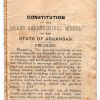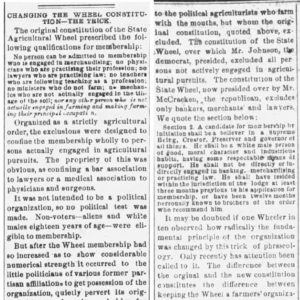calsfoundation@cals.org
Brothers of Freedom
One of several farmers’ organizations formed in Arkansas during the early 1880s, the Brothers of Freedom originated in Johnson County in 1882. Founded by Isaac McCracken and Marion Farris, the organization spread rapidly across northwestern Arkansas, recruiting between 30,000 and 40,000 members within three years. The Brothers of Freedom ceased to exist in 1885 when it merged with another Arkansas-based farmers’ organization, the Agricultural Wheel, and assumed the name of the latter organization. The impact of the Brothers of Freedom lived on, however, not only through the Agricultural Wheel but also through the Union Labor and Populist parties.
McCracken and Farris organized the Brothers of Freedom, originally (but only briefly) as a secret organization, in order to enable farmers to earn a “just reward” for their labor, partly through cooperative enterprises. The organization’s name was inspired by an old revolutionary organization called the Sons of Freedom, and republican, class-based rhetoric permeated the Brothers of Freedom’s Declaration of Purposes, which declared that “[w]hile it is an established fact that the laboring classes of mankind are the real producers of wealth, we find that they are gradually becoming oppressed by combinations of capital, and the fruits of their toil absorbed by a class who propose not only to live on the labors of others, but to speedily amass fortunes at their expense.” Practitioners of professions upon which the Brothers of Freedom apparently frowned—merchants, bankers, and lawyers—were forbidden to join the organization, as were women and African Americans. The organization urged members to practice a philosophy of “self-help” as well as diversified farming and cooperative enterprise. But these efforts failed to produce significant benefits for members of the Brothers of Freedom, which by 1885 had not only spread across northwestern Arkansas but had also chartered lodges in Alabama and Texas.
At first, the Brothers of Freedom banned political debate within its lodges; such debate held the potential of destroying an organization whose members included many Democrats, Republicans, and former supporters of the Greenback Party. But by 1884, some of the leading figures in the Brothers of Freedom, including McCracken and former Greenbacker Charles Tobey, began pushing the organization into electoral politics. Predictably, not all members supported this course of action, but in the fall elections that year, the Brothers of Freedom ran independent tickets in at least ten counties, mostly in northwestern Arkansas. The Brothers of Freedom also ran fusion tickets with the Republican Party in two other counties and with the Agricultural Wheel in two others. Brothers of Freedom candidates emphasized small farmers’ class interests and honest government. Of the sixteen counties in Arkansas where the Brothers of Freedom are known to have run independent or fusion tickets in 1884, they won complete or partial victories in twelve.
In 1885, leaders of the Brothers of Freedom began negotiations with leaders of the Agricultural Wheel (formed in Prairie County in 1882) to consolidate the two organizations. The merger occurred in October 1885, with the Brothers of Freedom relinquishing its name but choosing McCracken as the new president of the Agricultural Wheel. Under McCracken’s leadership, the Agricultural Wheel ran a state ticket and many county tickets in Arkansas in 1886 and helped form the Arkansas Union Labor Party, which in 1888 and 1890 presented the Arkansas Democratic Party with its most serious challenge since the end of Reconstruction. In the early 1890s, the Agricultural Wheel and the Union Labor Party gave way to the Farmers’ Alliance and the Populist Party. Although the independent and third-party movements led by Arkansas farmers’ groups (with assistance from the Knights of Labor) never did wrest control of state government from the Democratic Party, whose leaders proved willing and able to subvert democracy through violence and fraud, the farmers’ revolt ultimately influenced the policies of Arkansas Democratic officeholders, most notably Governor Jeff Davis in the early twentieth century.
For additional information:
Dunning, N. A., ed. The Farmers’ Alliance History and Agricultural Digest. Washington DC: Alliance Publishing Co., 1891.
Henningson, Berton E., Jr. “Northwest Arkansas and the Brothers of Freedom: The Roots of a Farmer Movement.” Arkansas Historical Quarterly 34 (Winter 1975): 304–324.
———. “Root Hog or Die: The Brothers of Freedom and the 1884 Arkansas Elections.” Arkansas Historical Quarterly 45 (Autumn 1986): 197–216.
Hild, Matthew. Arkansas’s Gilded Age: The Rise, Decline, and Legacy of Populism and Working-Class Protest. Columbia: University of Missouri Press, 2018.
———. Greenbackers, Knights of Labor, and Populists: Farmer-Labor Insurgency in the Late-Nineteenth-Century South. Athens: University of Georgia Press, 2007.
———. “Labor, Third-Party Politics, and New South Democracy in Arkansas, 1884–1896.” Arkansas Historical Quarterly 63 (Spring 2004): 24–43.
Saloutos, Theodore. Farmer Movements in the South, 1865–1933. Berkeley: University of California Press, 1960.
Matthew Hild
Georgia Institute of Technology



 Agricultural Wheel Article
Agricultural Wheel Article 



Comments
No comments on this entry yet.